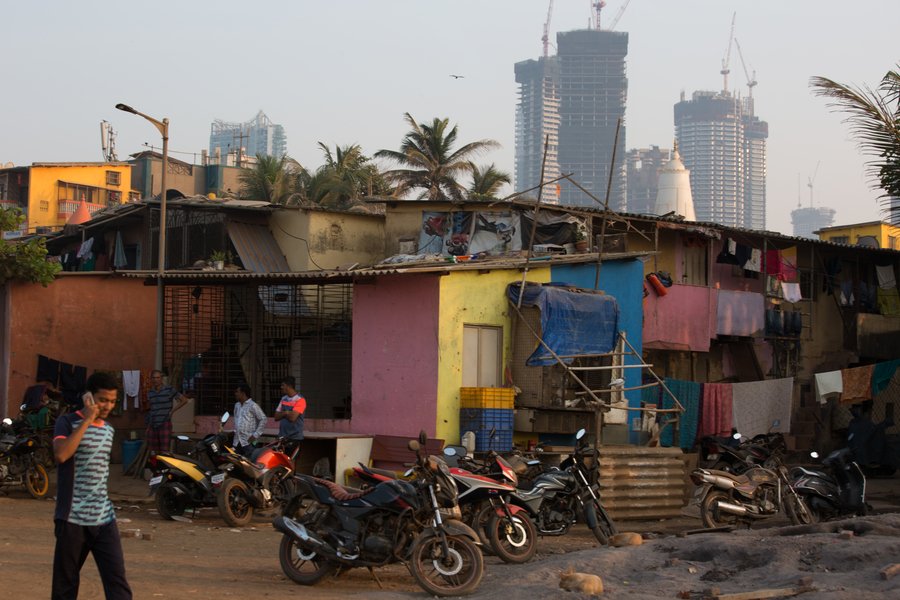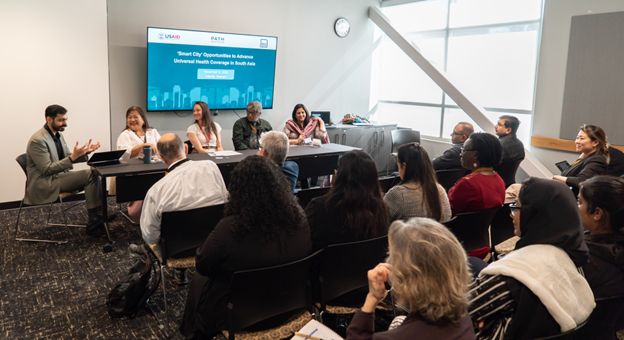Driving urban digital health for a connected, healthier future in South Asian cities
By: Varun Kaul, Digital Health Program Officer, PATH India; and Sophie Bochaberi, Digital Square Communications Officer
Our health is impacted by where we live, work, play, and grow. By 2050, the world's population is projected to reach 9.7 billion and 64% of people are expected to live in urban areas. Cities have become epicenters not only of culture and commerce, but also of unique health challenges, particularly in city-level health systems in low-resource settings. Digital health solutions can help address these challenges and enhance urban health care systems.
To advance urban digital health, Digital Square has conducted a landscape analysis of the digital health ecosystem in five cities across three Asian countries. The resulting report highlights commonalities, emerging trends, and unique developments in digital health in urban environments in India, Bangladesh, and Nepal.
'Smart City' opportunities to advance universal health coverage
To further the discussion, Digital Square staff attended the 19th International Conference for Urban Health (ICUH) in Atlanta, Georgia, on November 8, 2023. At the conference, Digital Square facilitated a panel discussion on how digital health and public infrastructure can be leveraged to advance universal health coverage (UHC) in South Asian cities. Experts from WHO SEARO, USAID’s Bureau for Asia, Eminence Associates for Social Development Bangladesh, and PATH South Asia shed light on their approach, emphasizing the intersection of technology, urban living, and public health.
Panelists and participants at the 2023 International Conference for Urban Health. Photo: María Blau Photography
"To leverage the potential of technology to aid in our pursuit of UHC, there is a clear need to understand country-level digital health ecosystems,” noted Micaela Arthur, Senior Health Officer at the USAID Bureau for Asia. “It is crucial that we examine the past and present digital health policies, along with the tools developed by our innovators and tech organizations, to develop a holistic understanding of the digital landscape."
An audience member asks a question to the panelists. Photo: María Blau Photography
Dr. Suvajee Good, Regional Advisor for Health Promotion and Social Determinants of Health, WHO Regional Office for South East Asia, India, emphasized the role of digital health systems in achieving UHC. "When looking at urban health and the role that digital can play, we must strive for a balance where every individual, regardless of their background or circumstance, has equitable access to the social determinants of health,” she stated. “True UHC embraces diversity, ensuring that the foundations of well-being are laid inclusively, fostering and involving communities where everyone can thrive."
Key takeaways from the session included:
Systems-Level Approach to Public Health: Urban health is not a singular challenge but a complex interplay of various factors. There is a need for a systems-level approach to address the multi-faceted urban ecosystems of South Asian cities.
Harnessing Emerging Technologies: Emerging technology and data must be leveraged to improve how cities predict, plan, and absorb the initial shocks of adverse events. Artificial Intelligence holds great potential in cities where foundational digital infrastructure is robust.
Collaboration for Urban Well-being: Cities, akin to living organisms, require close collaboration between the public and private sectors to sustain functionality. Health, a vital component, necessitates innovative partnerships to ensure the widespread reach of health technologies and approaches to those who need them most.
Paving the way for urban digital health
Digital Square's understanding of urban digital health is grounded in a comprehensive framework. Drawing inspiration from USAID's Vision for Health System Strengthening 2030 and the World Health Organization's six health system "building blocks," the framework focuses on four key pillars: equity, quality, resource optimization, and resilience. By examining these aspects, the framework aims to establish a robust understanding of digital urban health that fosters equitable healthcare access, ensures high standards of care, optimizes resource allocation, and bolsters resilience in the face of urban challenges. This holistic approach encompasses the interplay between digital health and urban well-being.
As we navigate the intersection of urban living and digital health, the insights shared in the panel discussion can guide a future where health equity, quality, resource optimization, and resilience take center stage in urban development. In a world that is increasingly defined by its cities, let us take up the collective responsibility for the well-being of all urban inhabitants and embark on the path towards comprehensive urban digital health.




